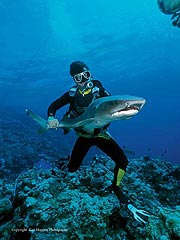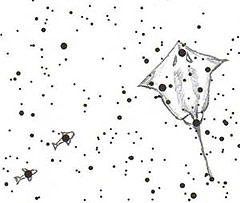Theme 5 - While most sharks and their relatives are not
aggressive towards humans there are some strategies you can
adopt to reduce the risk of shark attack when swimming or diving.
In the last 50 years, there have been only 61 human fatalities (1.22 per year) in Australian waters
from shark attack. While most sharks and their relatives are not aggressive towards humans there
are some strategies you can adopt to reduce the risk of shark attack when swimming or diving. These strategies are listed on the MESA Seaweek 2005 web site.
To learn more about shark attacks go to
the Australian Shark Attack File web site
www.zoo.nsw.gov.au/content/view.asp?id=126
Ideas for schools
Prepare a poster that encourages people to take steps to avoid sharks
when swimming. Share these ideas with your local surf life saving club. Also, see the relevant
information sheet on the MESA Seaweek 2005 web site compiled by John West, with links to the
schools-activities booklet. |
|

A shark scientist catching a small shark
Image © Ken Hoppen Photography
|

Aboriginal Skies by Paul Curnow, reproduced with permission.
Source: ching.apana.org.au/~paulc/loreaussie.html
|
|
Theme 6 - Sharks and their relatives are important to many
cultures including to Indigenous Australians.
For Aboriginal societies, whose economies were traditionally grounded on the hunting and gathering
of wild foods, animal symbols were naturally based on wild animal species. For many coastal
Aboriginal peoples, certain sharks and rays have positive associations and symbolic value.
Aboriginal groups recognise a wide diversity of species and they are able to observe them in their
habitat. While they recognize that some species such as tiger sharks and bull sharks are potentially
dangerous at certain sizes, they also know that most species are harmless to mankind. They view
them as powerful and worthy of respect, just as Westerners see eagles and lions as models of
independence, bravery, and might.
Ideas for schools
Invite local indigenous people or islanders to share some of their
stories about sharks with your school. Research stories in the library or on the Internet. Internet. Also, see
the relevant information sheet on the MESA Seaweek 2005 web site compiled by Matthew McDavitt,
with links to the schools-activities booklet. |
